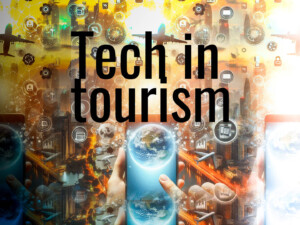AI and authenticity in tourism, hospitality: Why human stories still matter

With artificial intelligence (AI) and automation on the rise across many sectors of the global economy, how can travel, tourism, and hospitality brands benefit while staying true to themselves and the experiences they offer?
It’s Anishka Narula-Nielsen’s second “Good Tourism” Insight. [You too can share.]
Dawn of the AI age
Like it or not, we’re living at the beginning of the age of artificial intelligence (AI) and automation. AI already personalises guest experiences, automates bookings, and optimises everything from pricing to housekeeping schedules.
But while technology is transforming the tourism and hospitality space, one truth remains unchanged: people remember how they felt more than what they paid. In a world filled with smart technology and polished platforms, authenticity stands out as a key differentiator.
A powerful way to express this is through storytelling.
What AI is great at and where it falls short
There’s no doubt about the operational advantages that artificial intelligence (AI) brings to tourism and hospitality. With tools like real-time chatbots and personalised upselling, AI (potentially) enhances guest experience and increases business efficiency. It helps personalise recommendations for travellers, automate services to reduce wait times, and analyse data to predict customer behaviour and optimise pricing, among other benefits.
AI already plays a critical role in revenue management, refining pricing strategies and forecasting demand with impressive accuracy. Its integration into operational metrics like property reviews and Net Promoter Scores (derived from the ubiquitous survey question “How likely are you to recommend …”) signals a broader shift toward a data-driven, customer-focused approach.
Modern customer experience platforms no longer just respond to guest needs, they anticipate them. These systems learn from behaviour, synchronise across departments, and offer seamless service that feels personal, even though it’s powered by code.
In luxury hotels, AI can be used to enhance, but not replace, human interaction. When implemented thoughtfully, it enriches guest experiences while preserving the warmth of hospitality. Front desk staff are now ‘experience officers’ using AI to handle routine check-in tasks so they can focus on personalised greetings and meaningful engagement.
In contrast, budget hotels are integrating AI in check-in and check-out systems at self-service kiosks or apps to reduce the need for front desk staff, cutting costs, and streamlining operations for these establishments.
That said, the cost of implementation is a major concern, particularly for smaller hotels. Beyond initial investments, AI requires staff training, ongoing maintenance, and a rethinking of operational culture.
Aligning AI with a brand’s values also demands careful consideration, ensuring innovation enhances rather than erodes the essence of hospitality.
While AI does offer consistency and scalability, it does not replace the human touch, and cannot replicate emotional connection. And that’s where a brand’s true edge lies.
What’s missing? Human stories
Artificial intelligence (AI) can imitate a process, but it can’t replicate a feeling. It can automate a reply, but it can’t offer a heartfelt connection.
During my PhD research on tourism social enterprises, the distinction was clear.
Social enterprises don’t focus on technology, processes, or efficiency. They thrive because they have a deeper purpose. They show that success in tourism is about creating meaningful connections and they tell stories rooted in culture, community, and care.
Also read Anishka’s ‘A force for good: What can global travel & tourism learn from social enterprises?’
Storytelling allows tourism social enterprises to:
- Showcase their commitment to their environment by sharing inspiring stories about their eco-friendly initiatives and the people involved in them;
- Highlight their connections with local communities by weaving together stories that illustrate their support for local causes and partnerships, cultivating a sense of belonging and shared responsibility; and
- Build emotional trust with their audience through authentic stories that resonate on a personal level, allowing customers to relate to the brand’s values and mission, ultimately creating deeper connections and loyalty
In a digital-first world, this kind of engagement is vital. Data can help predict what customers want, but storytelling builds the why; the emotional bridge between brand and traveller.
Social media is more than marketing
Today’s travellers decide long before arrival whether they trust a brand. Much of that decision is shaped online. Social media isn’t just a promotional tool but an extension of the guest experience. It sets expectations and creates first impressions.
Social media shouldn’t be used to curate perfection. Leveraging social media most effectively involves telling real stories about:
- People — your team and community — and what they care about;
- Your behind-the-scenes efforts toward sustainability; and
- The challenges of running a small purpose-led business
When brands are transparent, personal, and purposeful, trust follows.
Where AI and storytelling meet
This “Good Tourism” Insight isn’t about rejecting technology. On the contrary, it’s about integrating it with intention; remaining mindful of your why. Artificial intelligence (AI) can help you do what you do, but your stories tell people why you do it.
The brands that thrive will maintain a clear sense of identity rooted in place, people, and purpose. They will use AI and digital platforms to streamline operations and to help distribute their authentic, mission-driven stories.
Think of a small ecolodge that uses AI for bookings but shares its reforestation efforts online. Or a tour company using automation for guest follow-ups, while spotlighting guides who share their own stories on social media. Technology handles the systems; the brand focuses on story and connection.
Search “GT” for content related to ‘storytelling’
Tailoring AI to meet the varying needs of guests — across micro-segments, property types, and regions — will become even more important. But it’s not just about tech upgrades. Preparing the workforce is equally important. Teams must adapt to a data-driven environment while maintaining the emotional intelligence that lies at the heart of hospitality.
For smaller and independent operators, even simple AI tools like automated guest messaging can make a meaningful difference. When applied thoughtfully, these tools enhance efficiency without compromising brand identity or the personal touch that sets them apart.
Managing the rapid pace of AI’s evolution while maintaining service consistency takes a thoughtful, strategic approach. It is not just about innovation. It’s about intention; making sure the tools we use serve the people and places that make travel meaningful.
AI can’t replace authenticity
How we distribute and deliver tourism and hospitality products will continue to evolve — and artificial intelligence (AI) will become even more embedded in operations — but let’s never forget what our industry really offers: experiences, emotions, memories, and connection.
In a world in which technology is everywhere, authenticity is your advantage. Ask yourself:
- What’s the story only my brand can tell?
- How am I leveraging technology to help tell the story and build trust?
- Is my digital presence consistent with my values in the real world?
Let’s face it: Today’s travellers aren’t looking for smart systems. They want something real.
What do you think?
In a comment below, share your own thoughts about artificial intelligence (AI) and automation in tourism and hospitality, and why authentic storytelling still matters.
(SIGN IN or REGISTER first. After signing in you will need to refresh this page to see the comments section.)
Or write a “GT” Insight or “GT” Insight Bite of your own. The “Good Tourism” Blog welcomes diversity of opinion and perspective about travel & tourism, because travel & tourism is everyone’s business.
“GT” doesn’t judge. “GT” publishes. “GT” is where free thought travels.
If you think the tourism media landscape is better with “GT” in it, then please …
About the author

Anishka Narula-Nielsen is a tourism consultant and researcher specialising in social enterprises’ role in sustainable tourism development.
Committed to “shaping a tourism industry that prioritises people, place, and purpose”, Dr Narula-Nielsen recently founded Roots and Routes Consulting, which helps tourism and hospitality businesses “refine their strategies for long-term success and sustainability”.
Passionate about “creating meaningful impact”, Anishka provides “strategic insights that enhance guest experiences, streamline operations, and integrate responsible tourism practices”.
She is based in London, UK.
Featured image (top of post)
AI and authenticity in tourism, travel, hospitality: Why human stories still matter. A Gemini-generated image.





